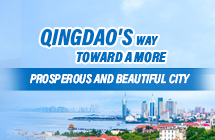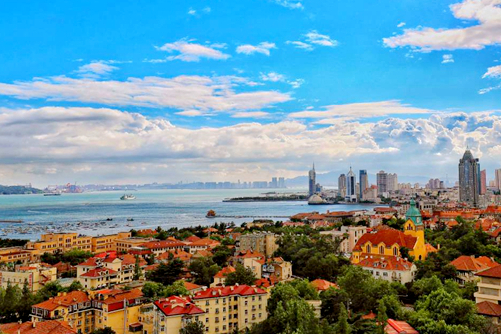New blueprint to enact modernization across Qingdao
Development plan aims to connect and spread out prosperity to surrounding areas
Shandong provincial government recently released the Development Plan for Qingdao Metropolitan Area, aiming to transform the urban development mode of megacities, seek the common growth of surrounding regions and enhance the high-quality development of the metropolis.
The plan proposes to accelerate infrastructure interconnection; promote collaborative development in modern industries; enhance open cooperation; improve ecological environment governance and facilitate convenient and shared public services; achieve the integrated development of Qingdao, Weifang, Yantai and Rizhao and lead the development of the Jiaodong Economic Circle.
Specific measures include constructing key industry chains; upgrading infrastructure, such as rail transit and buses, to create a one-hour commuting circle; contributing to the transformation of new and old driving forces in the city cluster on Shandong Peninsula; and boosting ecological protection and high-quality development in the Yellow River Basin.
"The metropolitan area is an important platform for participating in international competition and supporting economic growth," said Pan Zhaoyu, director of the land and transport department at the China Center for Urban Development.
"The world is experiencing unprecedented changes and the global economic landscape is adjusting rapidly. Qingdao should seize the historic opportunity of building a coordinated development pattern among large, medium and small cities based on urban clusters and metropolitan areas, and lead the metropolitan area to connect with the Beijing-Tianjin-Hebei region, the Yangtze River Delta, and important urban clusters in the Yellow River Basin and Northeast Asia," Pan said.
"It should also integrate with the Jinan metropolitan area and develop the Shandong Peninsula city cluster by seeking openness and innovation," he added.
The plan emphasizes the transformation of Qingdao's urban development mode and the strengthening of its core functions. "We will concentrate on enhancing economic growth, population density, innovation and radiating intensity to create a world-class bay area," Pan said.
Tu Qiyu, deputy director of the Institute of Urban and Demographic Studies at the Shanghai Academy of Social Sciences, said that the metropolitan area is an important strategy for driving regional development and an exploration of regional development mechanisms.
He believes that just as Qingdao is an important member of the Shandong Peninsula city cluster and the Jiaodong Economic Circle, the Qingdao Metropolitan Area is a synergy group and an innovative exploration of regional development.
Leng Jing, deputy director of the Urban Development Research Institute at the Qingdao Academy of Social Sciences, said: "The division of the metropolitan area highlights its economic value and significance. By crossing administrative boundaries and optimizing spatial structure, the metropolitan area will realize the free flow of resources and elements between the central city and surrounding areas on a larger scale."
"This is the first time that a regional coordinated development plan has been implemented based on a single central city," Leng said.
One major highlight of the plan is the emphasis on urban integration, especially promoting the development of integrated cities within Qingdao's proximity. It aims to deepen cooperation and innovation in planning layout; transportation connection; industrial collaboration and administrative services, thereby creating several supports for integrated development, Leng added.
Issued in 2022, the Opinions on Supporting Shandong in Deepening the Transformation of New and Old Driving Forces and Promoting Green, Low-carbon and High-quality Development and the recently released Spatial Planning of Shandong Province (2021-35) by the State Council both mentioned the Qingdao Metropolitan Area, highlighting its core functions in regional development.
"Constructing the metropolitan area is an effective path to enhance the development level of urban clusters and create active growth poles," said Xia Ji, director of the Yangtze Delta Region Research Institute at Hualue Think Tank.
Qingdao should leverage its basic advantages in scientific and technological innovation; the marine industry; openness and the digital economy; and strengthen industrial innovation, trade ports and digital infrastructure to better serve the development of the entire metropolitan area, it said.









 Play
Play  Play
Play